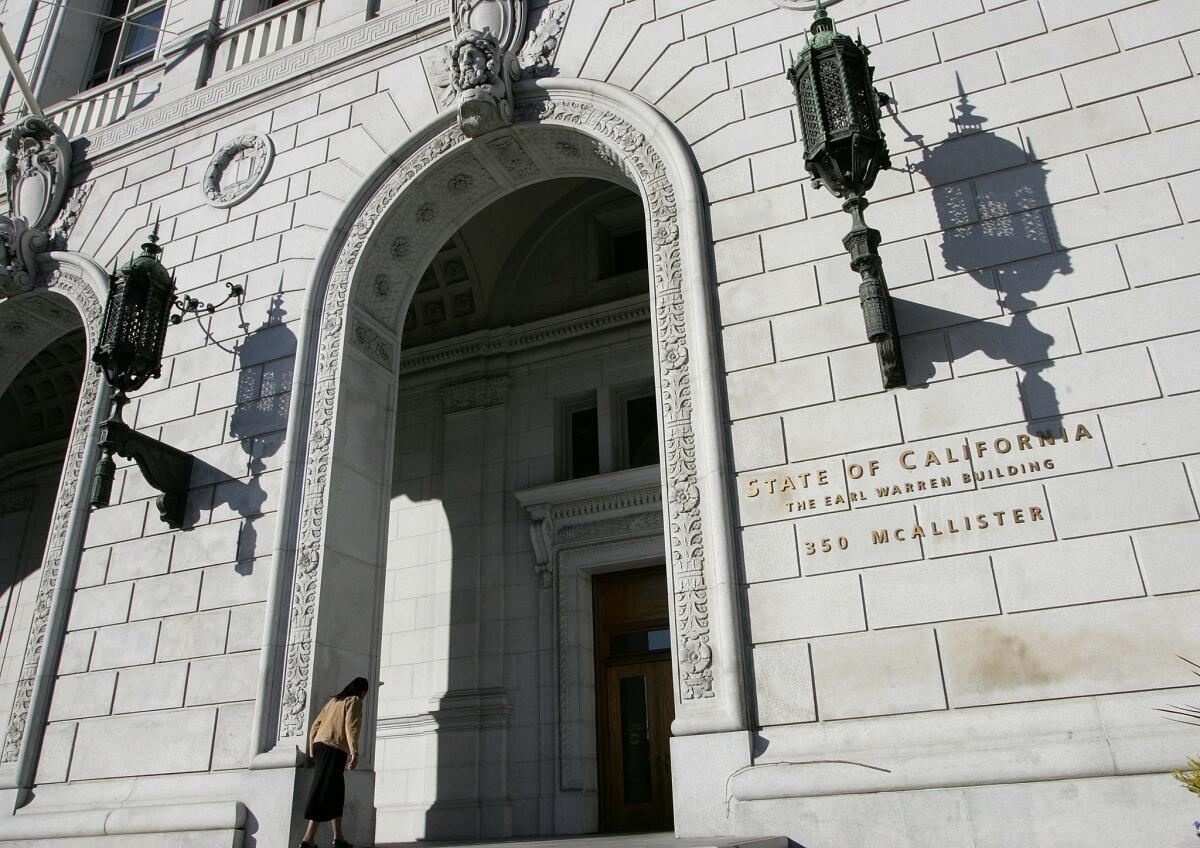Must Reads: An L.A. County deputy faked evidence. Here’s how his misconduct was kept secret in court for years
- Share via

They were at the tail end of their overnight shift when they spotted Gerald Simmons near a vacant lot in Inglewood.
The two Los Angeles County sheriff’s deputies said they saw the 43-year-old toss a plastic baggie of rock cocaine to the ground.
Their testimony would become the backbone of the 2009 criminal case against Simmons.
After a six-day trial, the verdict was swift. Guilty.
But jurors made their decision without knowing a crucial detail.
Jose Ovalle, one of the deputies who also booked the evidence, had been suspended five years earlier for pouring taco sauce on a shirt to mimic blood in a criminal case. He nearly lost his job.
Ovalle’s past was kept secret for years from prosecutors, judges, defendants and jurors, even though he was a potential witness in hundreds of criminal cases that relied on his credibility, according to a Times investigation.
A Times investigation
Aug. 9, 2018
You've been arrested by a dishonest cop. Can you win in a system set up to protect officers?
Aug. 10, 2018
This L.A. sheriff's deputy was a pariah in federal court. But his secrets were safe with the state.
Aug. 14, 2018
One cop came forward to expose secrets in his own ranks. The revelation rocked the court system.
Aug. 15, 2018
Here's how California became the most secretive state on police misconduct
The deputy took the stand in 31 cases before the district attorney’s office found out about his misconduct. Once his credibility came into question, prosecutors offered some career criminals generous plea deals in pending cases or dropped charges altogether. Some went on to commit serious crimes.
Ovalle is not an isolated example. Misconduct by law enforcement officers who testify in court is routinely kept hidden by California’s police privacy laws.
The U.S. Supreme Court requires prosecutors to inform criminal defendants about an officer’s wrongdoing — but the state’s laws are so strict that prosecutors cannot directly access the personnel files of their own police witnesses. Instead, California puts the burden on defendants to prove to a judge that an officer’s record is relevant.
Times reporters reviewed documents from hundreds of criminal cases in which the district attorney’s office identified Ovalle as a potential witness after he was caught faking the bloody evidence in 2003.
Few defendants tried to obtain information about Ovalle’s past. A handful of those who did weren’t given information about the deputy’s discipline. Judges never gave them a public explanation for why it wouldn’t have been relevant.
By the time the district attorney’s office learned about Ovalle’s misconduct, he had been a potential witness against 312 defendants. More than 230 were convicted.

A Times investigation last year identified Ovalle and others on a secret Sheriff’s Department list of deputies whose misconduct included falsely testifying in court, pulling over a motorist and receiving oral sex from her while on patrol, and tipping off a drug dealer’s girlfriend about a narcotics bust.
Los Angeles County Sheriff Jim McDonnell wanted to disclose the so-called Brady list of about 300 officers to prosecutors, but the deputies union went to court to stop him.
The state’s Supreme Court will soon decide whether McDonnell and other law enforcement agencies can tell prosecutors if a police witness has a record of serious discipline. An appellate court has ruled they cannot.
Ovalle now works as a sergeant in the Sheriff’s Department’s Century station in Lynwood. Last year, he was paid $240,000 in salary, overtime and other earnings.
When reached by The Times for comment, Ovalle said: “I don’t understand why the L.A. Times is so interested about me.” He declined to comment further and asked not to be contacted again.
‘It was stupidity’
Ovalle’s troubles began in August 2003.
Several gang members at the Pitchess Detention Center in Castaic had slashed an inmate’s neck and head with razor blades.
A 26-year-old deputy with just three years on the job, Ovalle was responsible for collecting the evidence and writing the incident report.
When he realized a bloody shirt from one of the suspects had gone missing, Ovalle took a clean one from the jail laundry, topped it with taco sauce and took a photo, according to court and law enforcement records.
A custody assistant watching Ovalle warned him not to do it, but the deputy went ahead and booked the photograph into evidence. The custody assistant reported him to a supervisor, according to court records.
Confronted by sheriff’s investigators, Ovalle confessed.
“It was stupidity now that I look back on it,” he told the investigators, according to a transcript of his interview obtained by The Times. “This uniform means everything to me, this badge and gun, it’s my life. … I’m embarrassed.”
Sheriff’s Department officials told Ovalle he would be fired but then relented, noting that he had cooperated with investigators and accepted responsibility, according to internal documents. Ovalle was instead handed a 30-day suspension. He was ordered to serve 10 of those days and the remainder only if he committed a similar offense within the next five years.
In testimony he gave years later, Ovalle blamed poor training for his conduct and downplayed the significance of what he had done, insisting he hadn’t fabricated evidence because the bloody shirt had once existed.
“I don’t consider myself a liar,” he said.
The Sheriff’s Department never notified the district attorney’s office about Ovalle’s actions to see if he should be charged with a crime, according to law enforcement records. As a result, prosecutors handling cases in which Ovalle was involved had no way of knowing about his past actions.
‘Trying to hide misconduct’
Two years after his suspension, Ovalle was transferred to the Sheriff’s Department’s Lennox station in South Los Angeles, where he made arrests for drug possession, theft and assault and later testified in court.
Defendants who faced him had only one method of possibly learning about his misconduct, a procedure that is itself cloaked in secrecy.

Under California’s so-called Pitchess laws, defendants can ask a judge to examine an officer’s personnel records for allegations of excessive force, dishonesty, theft or other acts of “moral turpitude.” Few go through the trouble.
By the spring of 2008, Ovalle had been listed by prosecutors as a potential witness against 125 defendants. Only five tried to delve into Ovalle’s background, according to a review of court records.
If a defendant’s Pitchess motion is granted, a representative from the officer’s law enforcement agency meets with the judge in private to go over relevant complaints. Neither the prosecutor nor the defense attorney is allowed in the room.
If a judge decides to turn over anything, it is usually only the name and contact information of someone who made a complaint against the officer within the last five years.
It is then up to the defense attorney to figure out what happened.
Supporters say the Pitchess laws prevent accused criminals from fishing for information about police witnesses that is irrelevant in their cases.
David E. Mastagni, a Sacramento-based attorney who represents police unions, said most defendants don’t file Pitchess motions because “in the vast majority of cases, the officer’s credibility is not an issue.” If an officer has a history of dishonesty, he said, a judge will almost always disclose it through Pitchess.
“It’s a pretty perfect balancing,” he said.
But defense lawyers complain that the laws make it difficult for people facing criminal charges to ask for the information. Many of their jailed clients, they say, don’t want to spend weeks or months trying to find out whether a law enforcement witness has a history of complaints, especially if they could accept a plea deal that would speed up their release.
“It isn’t a defeatist attitude as much as it is a realistic understanding of your client’s life,” said David Kanuth, a former L.A. County deputy public defender who is sharply critical of the state’s police privacy laws. “They are trying to hide misconduct, and everyone should be against it.”
Inside a secret 2014 list of hundreds of L.A. deputies with histories of misconduct »
One of the defendants who tried to dig into Ovalle’s background was Lamar Dotson. He had been returning to the Acacia Inn in Inglewood from his job as a security officer when Ovalle and his partner ordered him out of his car with guns drawn.
The deputies said they smelled marijuana and found two baggies with the drug. When they discovered a stolen gun in the trunk, Dotson explained he had confiscated it from someone at one of the clubs where he worked.
In court records and an interview with The Times, Dotson insisted the deputies lied about him having marijuana in the car to justify the search. He said he had kept the gun because he had been worried about getting into trouble if he turned the weapon in to authorities.
“I was 29 years old, never been in handcuffs, never been to jail,” Dotson told The Times.
Dotson’s attorney filed a Pitchess motion asking for the deputies’ history of misconduct, including fabricating evidence. The judge denied the motion. The case file and related transcripts have since been destroyed.
Dotson, who had no criminal history, ended up agreeing to a deal in which he pleaded no contest to carrying a loaded firearm and was placed on summary probation for three years. The misdemeanor conviction, he said, prevented him from obtaining a firearm permit for 10 years, hurting his efforts to find work as a security officer and bodyguard.
If he had known about Ovalle’s past misconduct, Dotson said, he would have fought harder for his case to be dismissed. But as months slipped by, his family members urged him to acquiesce.
“I was trying to get out of the situation as opposed to making it worse,” Dotson said. “It really upset me, to tell you the truth, but what can you do about it at that point? I did what I had to do to keep going forward.”
Can you win in a system set up to protect officers? »
Word about Ovalle’s misconduct began to spread after he arrested 18-year-old Sergio Martinez on suspicion of possessing methamphetamine in May 2008.
Martinez challenged Ovalle’s account of his arrest. His lawyer filed a Pitchess motion seeking any complaints accusing the deputy of fabricating or planting evidence.
Superior Court Judge Hector M. Guzman reviewed Ovalle’s personnel records and saw the Sheriff’s Department’s internal report about the taco sauce incident.
In an unusual move, the judge gave the records to the prosecutor and suggested the district attorney’s office decide whether Ovalle should be added to the agency’s database of problem officers to alert future defendants.
But that didn’t happen.
The prosecutor in the case, William Frank, told The Times he informed a supervisor about Ovalle’s misconduct soon after the hearing — just before he started a new job with the state attorney general’s office.
“I understood the seriousness of the material even though I was a relatively new lawyer. I knew what it meant for the case,” Frank said. “I felt I had done what I was supposed to do.”
A district attorney’s spokeswoman blamed “a miscommunication among prosecutors.”
The charges against Martinez were thrown out.
Juan Alvarez
• Suspected gang member known as “Demon,” arrested Aug. 10, 2008, by Deputy Jose Ovalle
• Accused of assault with a gun, facing more than a decade in prison
• Filed a Pitchess motion asking for allegations of misconduct against Ovalle
• Not informed that Ovalle had been suspended in 2004 for using taco sauce to mimic blood on evidence in a criminal investigation
• Filed another Pitchess motion saying Ovalle’s discipline was disclosed in a different case
• Accepted plea deal and released from prison eight months later
• Convicted in 10 cases since then, for domestic violence, drunk driving, violating a court order and drug possession
A month later, Ovalle took the stand at a preliminary hearing for Juan Alvarez, a suspected gang member known as “Demon.”
At 31, Alvarez had amassed a criminal record that spanned three states and included arrests for assault, drug possession, driving under the influence and domestic violence, according to court records.
Responding to a report of an armed assault, Ovalle said, he witnessed Alvarez toss a gun from his waistband, then flee down Lennox Boulevard. The deputies recovered a handgun from the scene, Ovalle testified. His misconduct never came up.
Alvarez’s defense attorney, Deputy Public Defender Ethna Burns, filed a Pitchess motion that accused Ovalle of lying in court about the arrest and asked for complaints against the deputy. Superior Court Judge Mark S. Arnold said he would turn over only information related to perjury or planting evidence.
After looking at Ovalle’s file, the judge initially determined there was nothing to disclose.
Burns objected. She demanded evidence about the taco sauce incident, which attorneys had been discussing in the Torrance courthouse.
At a later hearing, Arnold ordered the information be given to Burns and Paul Guthrie, the prosecutor handling the charges against Alvarez. Guthrie notified his office that Ovalle should be added to the district attorney’s database of problem law enforcement officers.
Alvarez was facing up to nearly 16 years in prison. A probation officer recommended he serve the maximum sentence if convicted.
“His criminal activity appears to be escalating and he does not appear to have been appreciative of the leniency afforded to him in the past,” she wrote in her report.
But after Alvarez learned of Ovalle’s wrongdoing, he struck a deal on Sept. 22, 2009, in which he pleaded no contest to carrying a loaded firearm. He was out on parole eight months later.
Alvarez has since been convicted in 10 additional cases, for domestic violence, drunk driving, violating a court order and drug possession.

Gerald Simmons
• Arrested Jan. 22, 2009, by Deputy Jose Ovalle on suspicion of drug possession
• Filed a Pitchess motion asking for allegations of misconduct against Ovalle
• Not informed that Ovalle had been suspended in 2004 for using taco sauce to mimic blood evidence in a criminal investigation
• Convicted at trial on Aug. 18, 2009
• Judge threw out Simmons’ conviction after learning about Ovalle’s misconduct
• Convicted in 2013 of intentionally infecting a girlfriend with HIV
• Still in a Nevada prison
A day after Alvarez’s plea agreement, another Ovalle case was rapidly crumbling in the same courthouse.
Gerald Simmons, the Inglewood man who had been convicted of cocaine possession after Ovalle and a partner said they spotted him dropping a baggie of drugs, was requesting a new trial.
Months earlier, his attorney, Jennifer Cheng, had filed a Pitchess motion. She alleged that the deputies “intentionally lied about their observations in order to create a case against Mr. Simmons.”
Her motion was granted, but the information she was given about the deputies did not mention the taco sauce incident.
Simmons’ criminal record dated back two decades and included assault with a deadly weapon, drug possession, attempted robbery and burglary. He had violated parole and probation several times.
After the jury found him guilty, he faced up to 12 years in prison.
But before sentencing, Cheng and the prosecutor learned of Ovalle’s misconduct, according to court records.
The judge threw out the conviction. He ruled Ovalle had been a “significant material witness” and that his fabrication of evidence in 2003 went to “the very heart of this case.”
Less than two years later, Simmons was in Las Vegas when he intentionally infected a girlfriend with HIV, court records show. He was sentenced to up to 12 ½ years in prison.
The 53-year-old was recently denied release. The parole board said his crimes were becoming increasingly more serious.
[email protected] | Twitter: @corinaknoll
[email protected] | Twitter: @bposton
[email protected] | Twitter: @mayalau
Sign up for Essential California
The most important California stories and recommendations in your inbox every morning.
You may occasionally receive promotional content from the Los Angeles Times.











